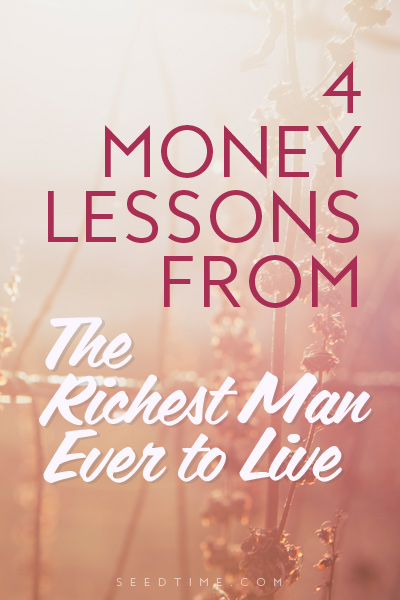written by Bob Lotich, CEPF® | Biblical Personal Finance
The Bible says that Solomon was the richest man who ever lived and also the wisest ever to live (1 Kings 4:31).
According to Constative, his Net Worth was over $2 TRILLION. I think that makes him qualified to give some financial advice.
 I know there is some debate over whether or not Solomon wrote Ecclesiastes, so just in case he didn’t we can use the alternate title of: ‘Financial Lessons from someone wise.‘ 😉
I know there is some debate over whether or not Solomon wrote Ecclesiastes, so just in case he didn’t we can use the alternate title of: ‘Financial Lessons from someone wise.‘ 😉
1. Money does not satisfy
- He who loves money with not be satisfied with money… –Ecclesiastes 5:10
Loving money is a dangerous thing. Some people spend their entire lifechasing more and more money thinking that it will bring them satisfaction, only to never actually attain the satisfaction they were searching for.
True satisfaction only comes from God. It doesn’t come from getting married, a bigger house, a Million in the bank, or being retired. What is interesting is that when we take our focus off of getting more money and more things, then they seem to start appearing.
I guess this is what was meant by the verse in Matthew:
“But seek first His kingdom and His righteousness, and all these things will be added to you.”
2. Diversify your investments
- Divide your portion to seven, or even to eight, for you do not know what misfortune may occur on the earth. –Ecclesiastes 11:2
I get two things out of this verse. First, that Solomon lays out the groundwork for diversification. I like the balance of having 7-8 “eggs in the basket,” rather than just one that would leave us with nothing if it turned out bad. But also, not 200 minuscule eggs that are worth next to nothing individually.
In this case, if any one investment performed very well, it would make very little impact on the portfolio as a whole. On the other hand, if you had seven investments and any one of them performed well, it would have a decent impact on the portfolio as a whole.
3. There is never a perfect time
- He who watches the wind will not sow and he who looks at the clouds will not reap. –Ecclesiastes 11:4
I think the reason that some of us wait for the perfect time to do something is because we are trying to wait until there is no risk. It is human nature – we want to eliminate any and all risk of bad things happening.
No matter how much we try, we can NEVER eliminate all risk. Any time we step out into anything there will be some level of risk, but that is not an excuse not to take action.
If it is stepping out into a new job, taking the first step to get out of debt, quit a bad habit, start a side business, or anything else – there will always be an excuse not to take action.
Step out and be one of those people who realizes that the perfect time is now.
4. Work Smarter, Not Harder
- If the axe is dull and he does not sharpen its edge, then he must exert more strength… –Ecclesiastes 10:10
Steven Covey calls this his 7th Habit of Highly Effective People. He calls it “Sharpening the Saw.” Sometimes the most effective thing we can do is to rest. Though, it seems counter-intuitive, it really isn’t. Resting, allows for more production on your productive hours.
People who live by this principle realize that often 6 hours can be more productive when accompanied with rest than 10 without.
This was another lesson that I learned the hard way while in school. I would frequently spend 4 hours on homework, when I am sure I could have done it easily in 2 hours. I was living in a sleep-deprived zombie-like state because I “had better things to do with my time than sleep.”
Because my brain was functioning well below its capability, it took me a lot longer to finish my assignments.
My best success with this has been by regularly asking myself am I working hard or working smart? They aren’t mutually exclusive, but if you are only focusing on working hard, without actually thinking about if it is the smartest method, then you could be wasting your time with a dull axe.
Any other financial lessons from Solomon that I missed?
Related Posts
How Cars Affect your Financial Freedom
5 lessons from the garden about fruit bearing
Life Lessons from 6 Famous Failures
How to Survive a Financial Crisis: 12 Tips For Married Couples
About Bob Lotich, CEPF®
Bob Lotich, CEPF® is a Certified Educator in Personal Finance and has over 15+ years experience writing about Biblical personal finance. He is the award-winning author of Simple Money, Rich Life and has been named a top 20 social influencer in personal finance. Check out his on-demand Christian financial class for couples, small groups and churches called True Financial Freedom.